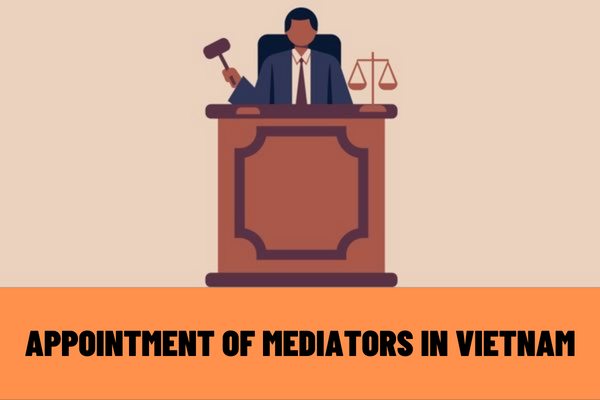What are the requirements for appointment of mediators in Vietnam? What are the procedures for appointment of mediators in Vietnam?
What are the requirements for appointment of mediators in Vietnam?
Pursuant to Article 10 of the 2020 Law on Mediation or Dialogue at Court in Vietnam stipulating the requirements for appointment of mediators in Vietnam as follows:
- A Vietnamese citizen who is permanently residing in Vietnam, loyal to the Fatherland and the Constitution of the Socialist Republic of Vietnam, has full legal capacity, good moral qualities, is exemplary in the observance of the law.
- Used to be a Judge, Court Examiner, Court Clerk, Procurator, Procurator Inspector, Civil Judgment Executor, Inspector; having at least 10 years of experience as a lawyer, expert, or professional; being knowledgeable about customs and traditions and having prestige in the community;
- Having experience and skills in mediation or dialogue;
- Attaining fitness to complete the assigned tasks;
- Possessing a certificate of professional training in mediation or dialogue conducted by a training facility of the Supreme People's Court, unless he/she has been a judge, court examiner of chief examiner or senior examiner level, court clerk of chief clerk or senior clerk level, procurator, executor of civil judgment, or inspector.

What are the requirements for appointment of mediators in Vietnam? What are the procedures for appointment of mediators in Vietnam?
What are the procedures for appointment of mediators in Vietnam?
Pursuant to Article 6 of Circular 04/2020/TT-TANDTC, the procedures for appointment of mediators in Vietnam are as follows:
Step 1: Announce the need to select a Mediator
Based on the demand and the approved number of mediators, the People's Court of the district and the People's Court of the province shall announce the selection of the mediator and publish it on the mass media of the locality, posted up at the headquarters of the People's Court where there is a need within 15 working days from the date of posting the notice or posting.
Step 2: Receive application for appointment of Mediator
- Persons who are eligible according to the notice of need for selection of a mediator shall submit a dossier to request the appointment of a mediator at the court where he or she wishes to act as a mediator.
- The People's Court of the place where the application is received shall examine and receive the dossier with all documents as prescribed.
- Within 05 working days from the expiration of the time limit for receiving the dossier, the Court where the dossier is received must conduct the classification of the dossier.
For cases where a certificate of training in conciliation and dialogue skills is required, a list of people sent for training shall be sent to the provincial-level People's Court for summarizing and reporting to the Supreme People's Court.
- The Department of Organization and Personnel of the Supreme People's Court synthesizes the list sent by the provincial People's Court and makes a document to transfer to the Court Academy to organize training courses and grant certificates according to regulations.
- After the cases sent to foster care have been granted certificates, the Courts where the dossiers are received shall select qualified persons and request in writing the Chief Justices of the provincial-level People's Courts to consider and appoint (through the consulting unit on the organization and staff of the provincial People's Court).
Step 3: Advice on choosing a Mediator
- Within 07 working days from the date of receipt of a complete application for appointment of a mediator, the unit advising on personnel organization of the provincial People's Court shall report to the Advisory Council for consideration and selection of mediators.
- Within 03 working days from the date on which the advisory unit on personnel organization of the provincial-level People's Court issues a document, the Advisory Council shall hold a meeting to consider, agree and issue a resolution to select the person with the position of competent authority. Qualify as a Mediator
Step 4: Make a decision to appoint a Mediator
- Pursuant to the Resolution of the Advisory Council, the unit advising on personnel organization of the provincial People's Court shall submit to the Chief Justice of the provincial People's Court for decision to appoint a mediator.
- Within 05 working days, the Chief Justice of the People's Court of the province shall consider and decide to appoint the mediator.
- In case of refusal to appoint, the Chief Justice of the People's Court of the province must notify in writing and clearly state the reasons therefor.
Step 5: Public announcement of the list of Mediators
Within 05 working days from the date of issuance of the appointment decision, the Chief Justice of the provincial People's Court shall publish the list of mediators on the website of the provincial People's Court and post it at the head office. The Court where the Mediator works;
At the same time, send it to the Supreme People's Court (through the Organization and Personnel Department) for management and publication on the Website of the Supreme People's Court as prescribed.
What are the contents of the application for appointment of mediators in Vietnam?
Pursuant to Clause 2, Article 11 of the 2020 Law on Mediation or Dialogue at Court in Vietnam, an application for appointment of a mediator comprises:
- An application form for appointment;
- A curriculum vitae and police (clearance) certificate;
- A fitness to work certificate issued by a competent health authority;
- A proof of eligibility prescribed at Point a, Clause 1, Article 10 of the 2020 Law on Mediation or Dialogue at Court in Vietnam;
- A certificate of professional training in mediation or dialogue.
LawNet
